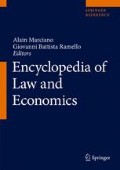Abstract
Efficiency is an important concept in the field of law and economics. The precise meaning of the term efficiency is not unequivocal and depends on the context in which it is used. In practice, efficiency often relates to economic efficiency. However, such forms as social and political efficiency can also be very important for the continuity of a society or an organization.
Access this chapter
Tax calculation will be finalised at checkout
Purchases are for personal use only
References
Buchanan JM (1993) How can constitutions be designed so that politicians who seek to serve “public interest” can survive and prosper? Constit Polit Econ 4(1):1–6
Buchanan JM, Tullock G (1974) The calculus of consent: logical foundations of constitutional democracy. University of Michigan Press, Ann Arbor
Calabresi G (1961) Some thoughts on risk distribution and the law of torts. Yale Law J 70(4):499–553
Coase RH (1960) The problem of social cost. J Law Econ 3(1):1–44
Coelli T, Prasada Rao DS, Battese GE (1998) An introduction to efficiency and productivity analysis. Kluwer, Boston/Dordrecht/London
Gavious A, Mizrahi S (2002) Maximizing political efficiency via electoral cycles: an optimal control model. Eur J Oper Res 141(1):186–199
Granovetter M (1985) Economic action and social structure: the problem of embeddedness. Am J Sociol 91(3):481–510
Jackson PM (2011) Governance by numbers: what have we learned over the past 30 years? Public Money Manag 31(1):13–26
Jolls C, Sunstein CR, Thaler R (1998) A behavioral approach to law and economics. Stanford Law Rev 50:1471–1550
Korobkin RB, Ulen TS (2000) Law and behavioral science: removing the rationality assumption from law and economics. Calif Law Rev 88(4):1051–1144
Lefeber L, Vietorisz T (2007) The meaning of social efficiency. Rev Polit Econ 19(2):139–164
Leibenstein H (1966) Allocative efficiency vs. “X-efficiency”. Am Econ Rev 56(3):392–415
ter Bogt HJ (2003) A transaction cost approach to the autonomization of government organizations. Eur J Law Econ 16(2):149–186
Wildavsky A (1966) The political economy of efficiency: cost-benefit analysis, systems analysis, and program budgeting. Public Adm Rev 26(4):292–310
Author information
Authors and Affiliations
Corresponding author
Editor information
Editors and Affiliations
Rights and permissions
Copyright information
© 2019 Springer Science+Business Media, LLC, part of Springer Nature
About this entry
Cite this entry
ter Bogt, H.J. (2019). Efficiency, Types of. In: Marciano, A., Ramello, G.B. (eds) Encyclopedia of Law and Economics. Springer, New York, NY. https://doi.org/10.1007/978-1-4614-7753-2_43
Download citation
DOI: https://doi.org/10.1007/978-1-4614-7753-2_43
Published:
Publisher Name: Springer, New York, NY
Print ISBN: 978-1-4614-7752-5
Online ISBN: 978-1-4614-7753-2
eBook Packages: Economics and FinanceReference Module Humanities and Social SciencesReference Module Business, Economics and Social Sciences

